Redditor Refuses To Visit Dad For Christmas Because Of His Aggressive Dog, Gets Blamed For The Dog's Behavior
Dogs are accustomed to coexisting with humans and enjoy winning our favor. However, we still need to teach them to shun some of their more harmful habits.
Many pet habits are deemed dangerous or unpleasant by their owners. The two most prevalent dog behavior issues are aggression and scavenging.
If the problem is brand new and out of the ordinary for your dog's routine, you should first consider taking your doggo companion to the vet to rule out any health issues. It's also crucial to keep in mind that some behaviors that some owners regard as serious problems are, in fact, minor for others.
Meet u/Large-Animator1563, the OP of today's AITA story, whose child has developed a severe dog phobia after being attacked by the OP's dad's dog as a toddler. The child has been working very hard with a psychologist to help overcome this fear.
Meanwhile, the dad’s dog passed away, and a few months later, he informs the OP that they have a new dog. As you can already tell, the OP wasn't too happy about this.
The OP visited and discovered that the dog is very skittish and bites when people move their hands quickly or talk too loudly. This was a problem, as the OP couldn't bring his child over even when the dad expressed his intentions about wanting everyone to come for Christmas.
The OP writes

The OP's child has a nasty dog phobia after being attacked by the dad's dog
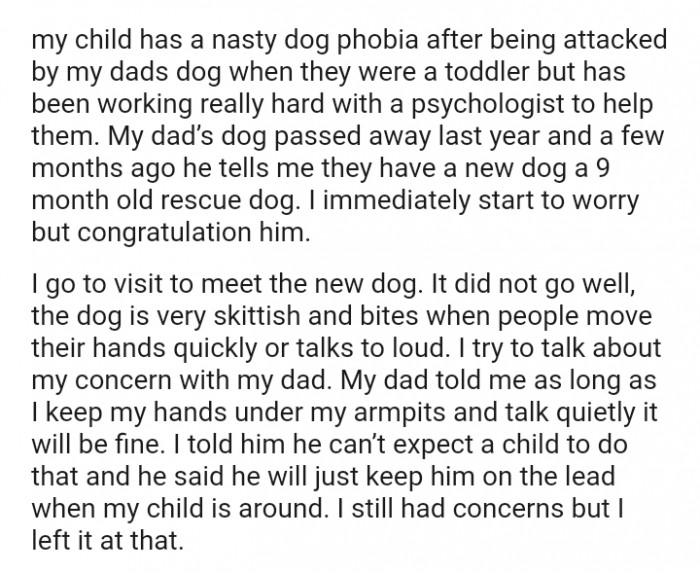
Every time I tried to move the dog away, he would bite me
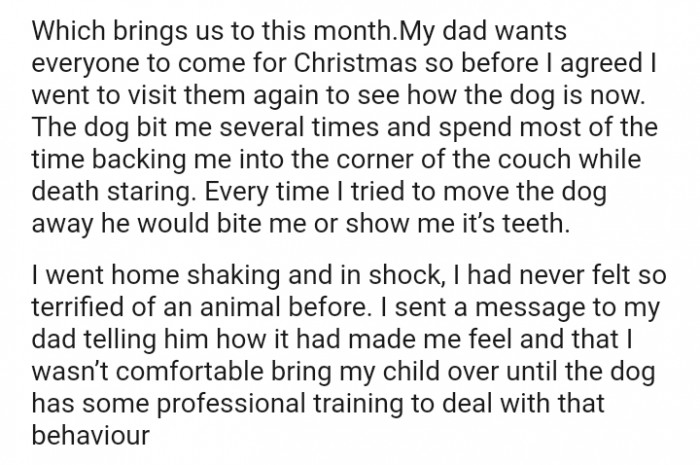
Understanding Fear Responses
The dilemma faced here highlights the intersection of fear and familial obligations. Dr. Sarah Thompson, an animal behaviorist and psychologist, emphasizes that fear responses, particularly related to aggressive animals, can be deeply rooted in past experiences.
Her research indicates that individuals often perceive threats based on previous encounters, leading to heightened anxiety and avoidance behaviors around perceived danger.
Understanding Fear and Its Manifestations
Fear can manifest in complex ways, especially when it comes to pets. According to Dr. Karen Horney, a leading psychologist on anxiety and fear, individuals often project their fears onto animals that are perceived as threatening.
This projection can lead to misunderstandings and conflict, particularly when family members have differing views on the behavior of pets.
It will take a lot of time, and we need to be patient
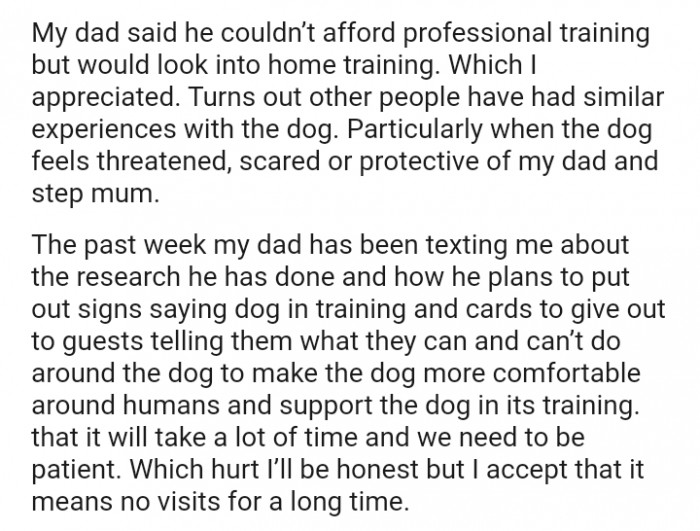
The OP started to feel like he was being blamed for the dog's behavior
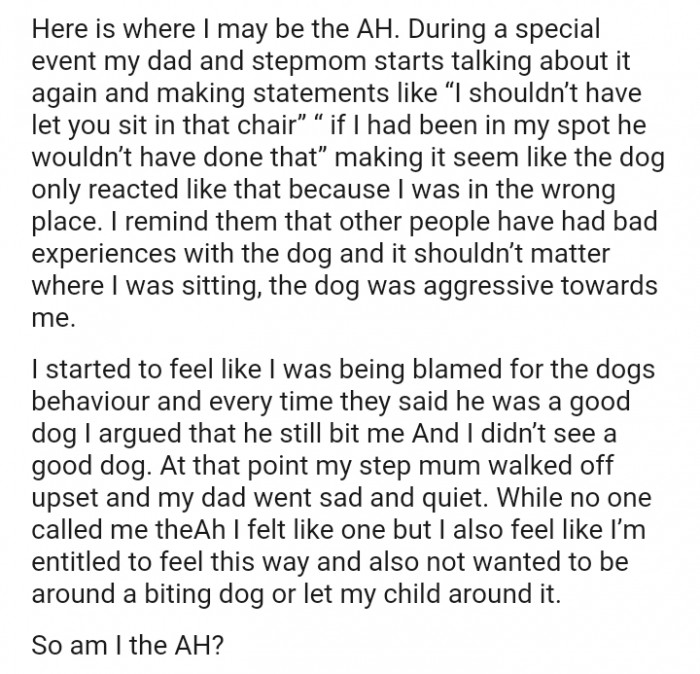
Here are some of the top comments from Redditors for you to read through below

According to studies in the Journal of Clinical Psychology, individuals may experience a range of emotional reactions when confronted with aggressive animals, often oscillating between fear and anger. The father's insistence on labeling the dog as 'good' could reflect a defense mechanism to protect his emotional investment in the pet, despite its behavior.
This disconnect can create significant conflict, particularly when one family member has had negative experiences with the animal.
Research published in the Journal of Anxiety Disorders shows that when individuals feel their safety is compromised by an animal, they often react defensively. This can lead to blame and conflict within families, particularly if one member doesn't recognize the other's fear as valid.
Understanding these dynamics is crucial for fostering empathy and reducing tensions.
Your dad is being unreasonable
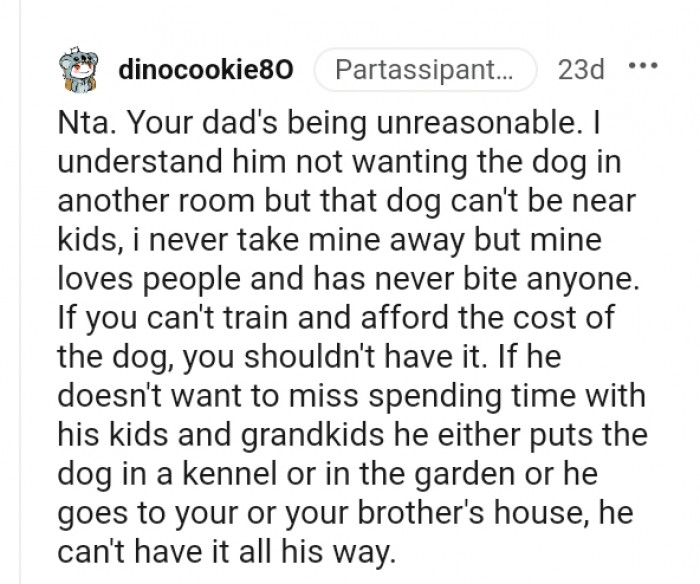
It's nice that he took in a rescue, but...
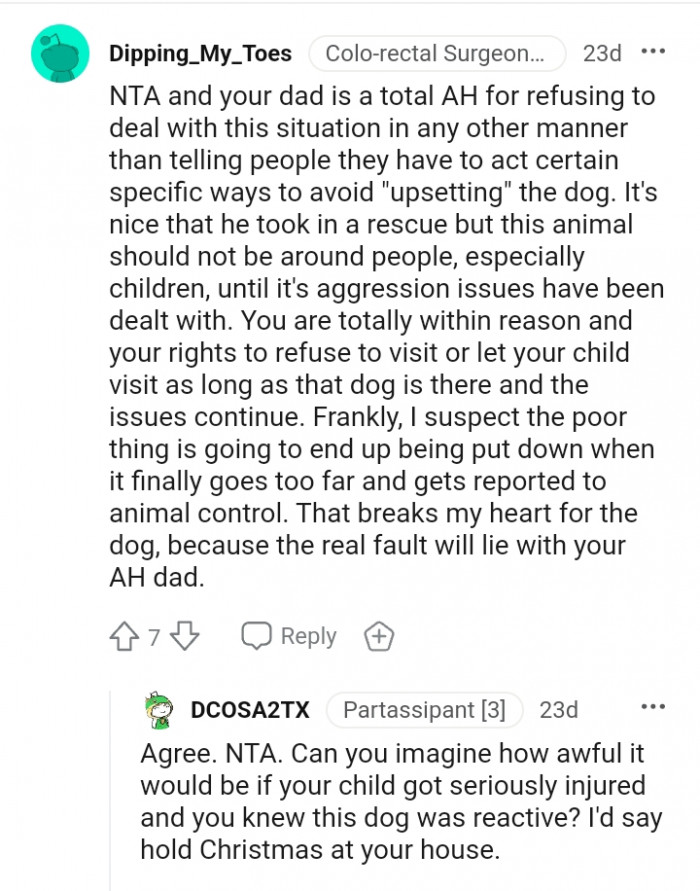
It's a tricky business and requires close observation
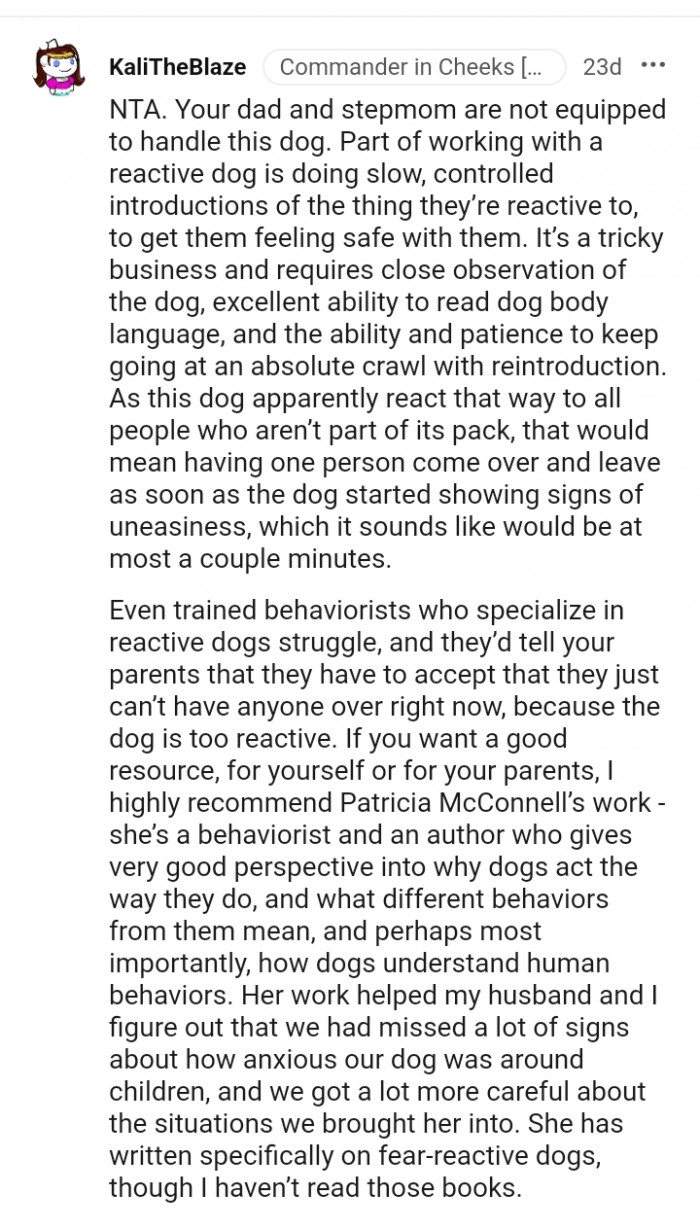
Addressing Fear and Safety Concerns
For families navigating these dynamics, it’s crucial to prioritize safety while also addressing fear responses. Behavioral experts recommend implementing controlled introductions between the dog and family members who are fearful, allowing for gradual exposure to reduce anxiety.
Therapeutic interventions, such as desensitization techniques, can also be beneficial in helping individuals manage their fear of aggressive animals.
The Role of Communication in Resolving Conflict
Effective communication is vital in resolving conflicts related to fear of pets. Encouraging open dialogues about feelings can help family members express their fears without feeling judged or dismissed.
Research shows that using non-confrontational language can significantly improve the quality of discussions, allowing for more constructive outcomes.
Your father's behavior is unconscionable
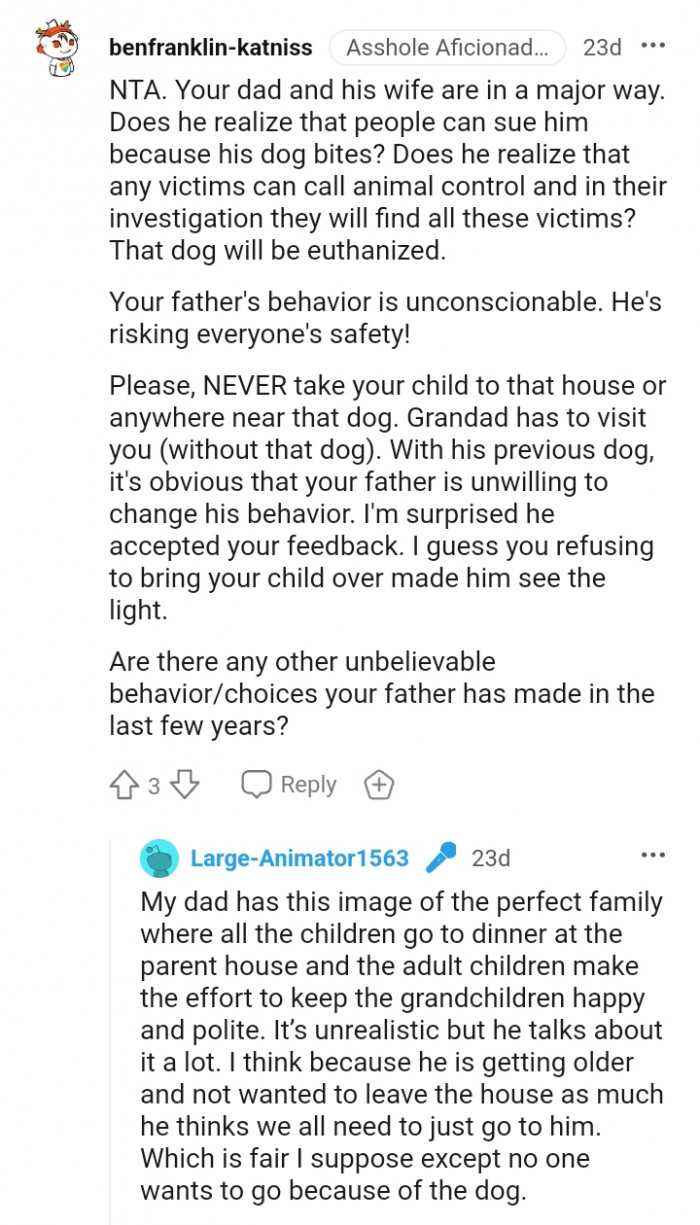
This has happened on more than one occasion
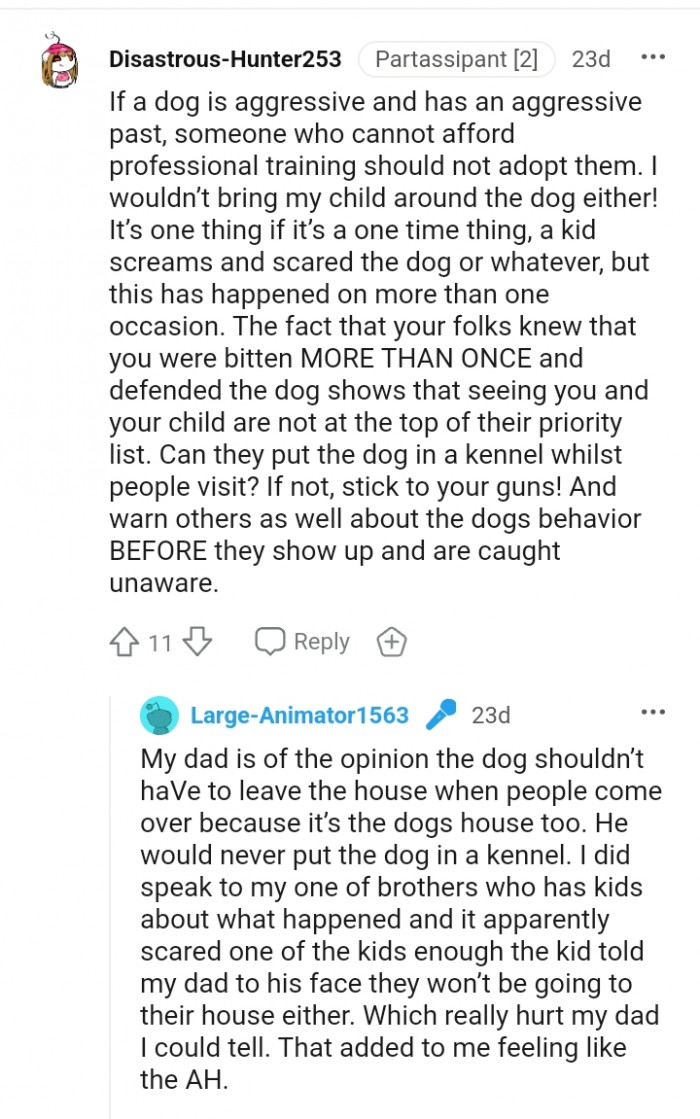
You're not the AH for not wanting to put yourself in that situation
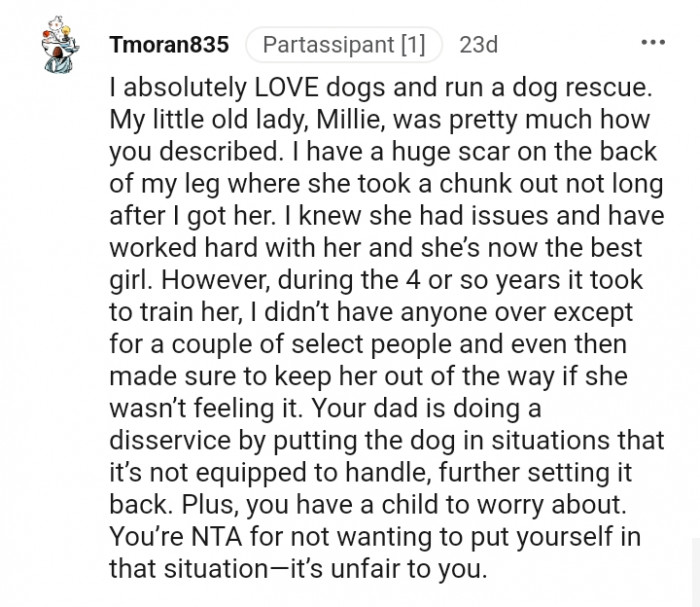
Creating a safe space for open dialogue about fears can facilitate understanding and empathy within the family. Regular family discussions about boundaries, especially regarding the dog, can help clarify expectations and ensure that everyone feels secure in their environment.
Additionally, exploring training options for the dog can help alleviate concerns and improve its behavior, ultimately fostering a more harmonious family dynamic.
Behavioral strategies can also be adopted to mitigate fears surrounding pets. Gradual desensitization, a technique often used in therapy, involves slowly introducing the fearful individual to the pet in a controlled environment.
This method has been shown to reduce anxiety and improve relationships by fostering a sense of safety and control.
Your dad needs to rethink the kennel training
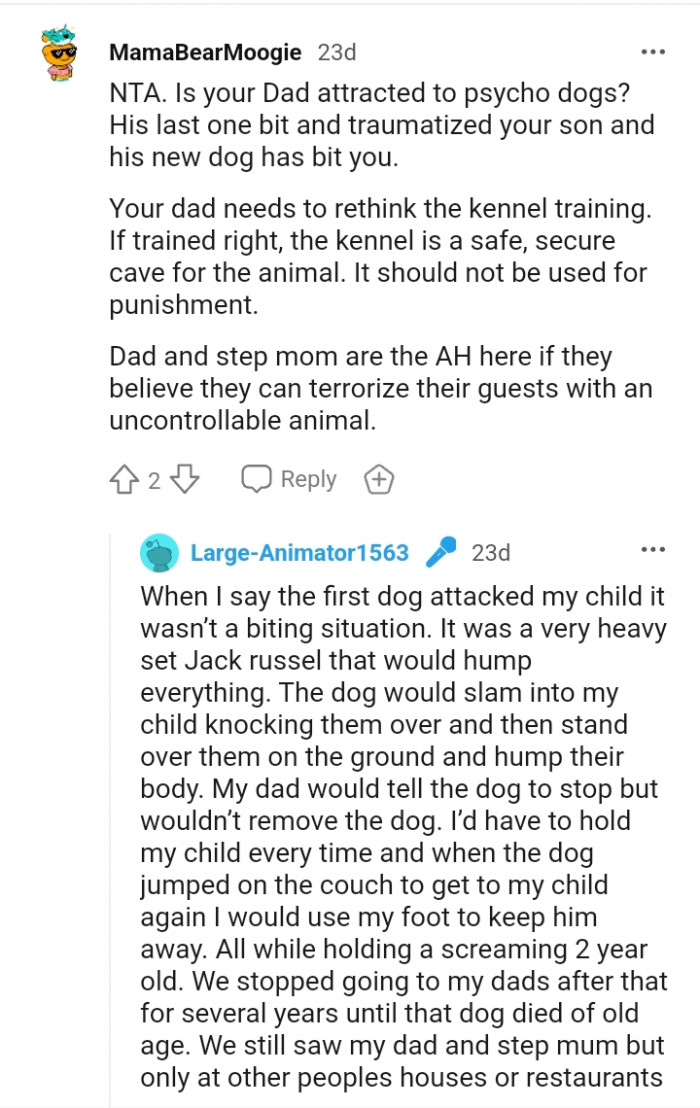
You would be the AH if you don't call animal control
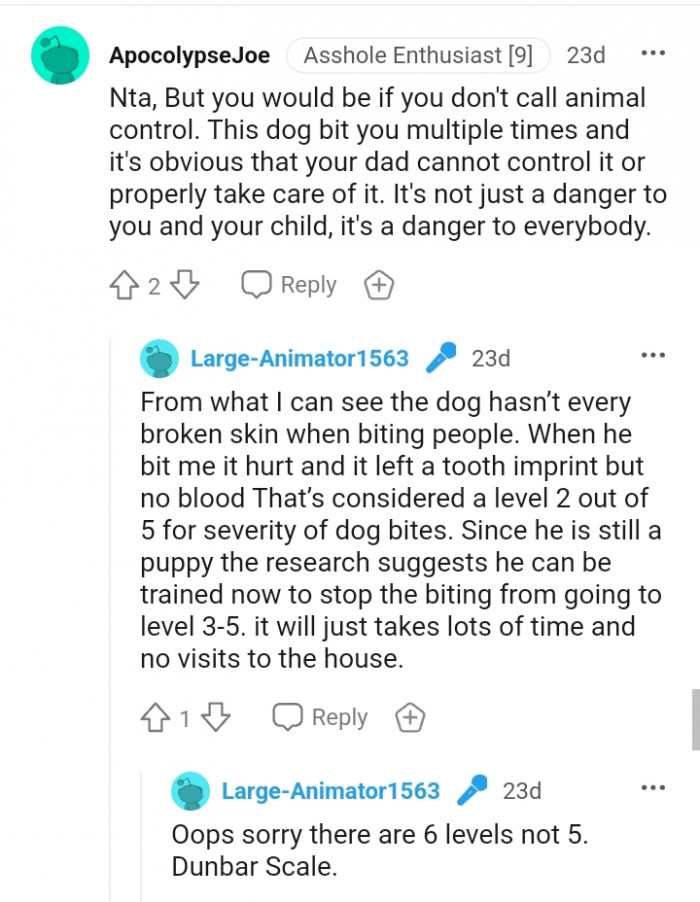
He is too much for most people
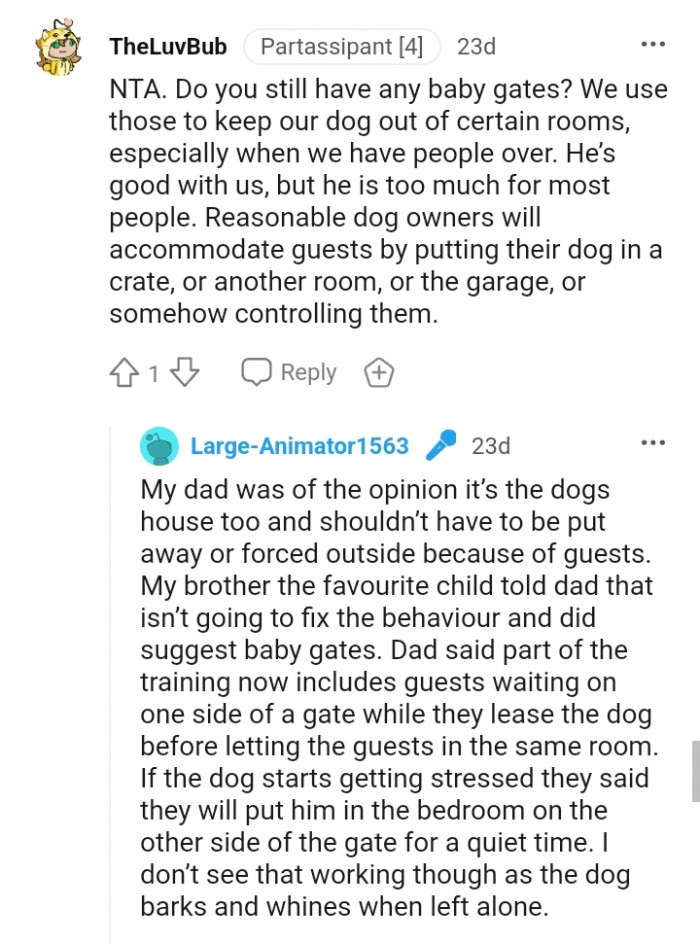
Balancing Safety and Family Relationships
Finding a balance between ensuring safety and maintaining family relationships is crucial. Setting clear boundaries regarding the dog's behavior and creating safe spaces for the fearful family member can help bridge the gap.
Psychologists recommend regular family meetings to discuss concerns and develop strategies that respect everyone’s needs.
This Redditor advises the OP to stay away

This Redditor loves dogs, and dogs return the love
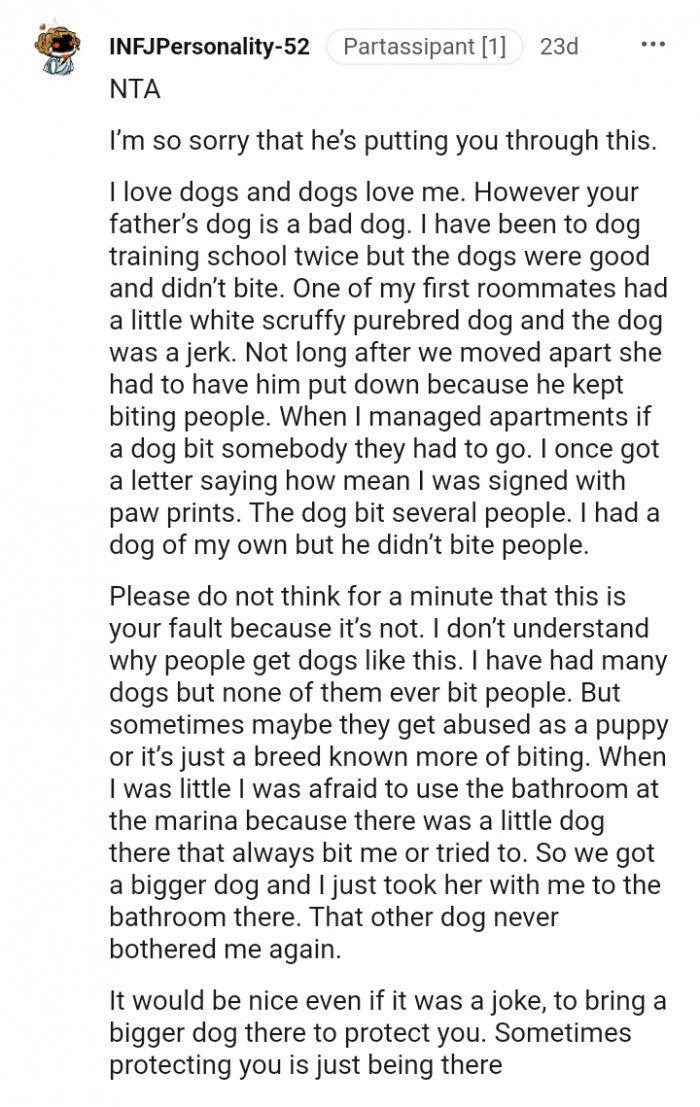
For not looking at that dog
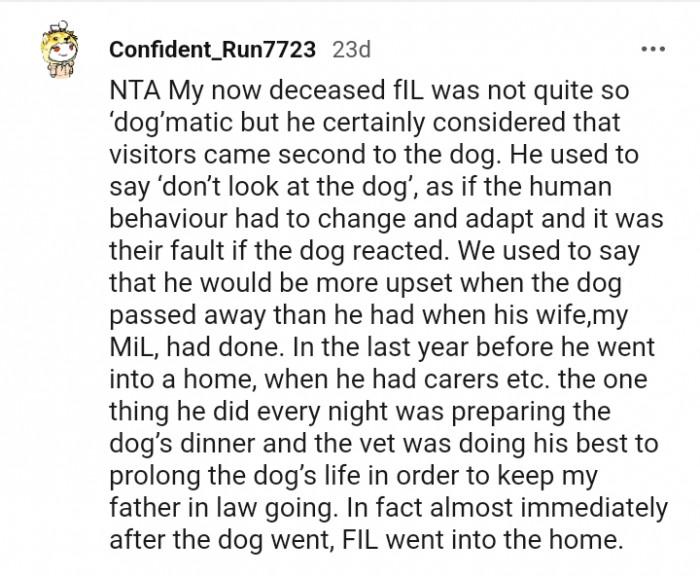
Ultimately, fostering an environment of understanding and support is essential for resolving conflicts related to fear. Encouraging family members to express their feelings openly can help create a culture of empathy.
Acknowledging that fears are valid and deserve attention can significantly improve family dynamics.
Your dad is not doing this dog any good
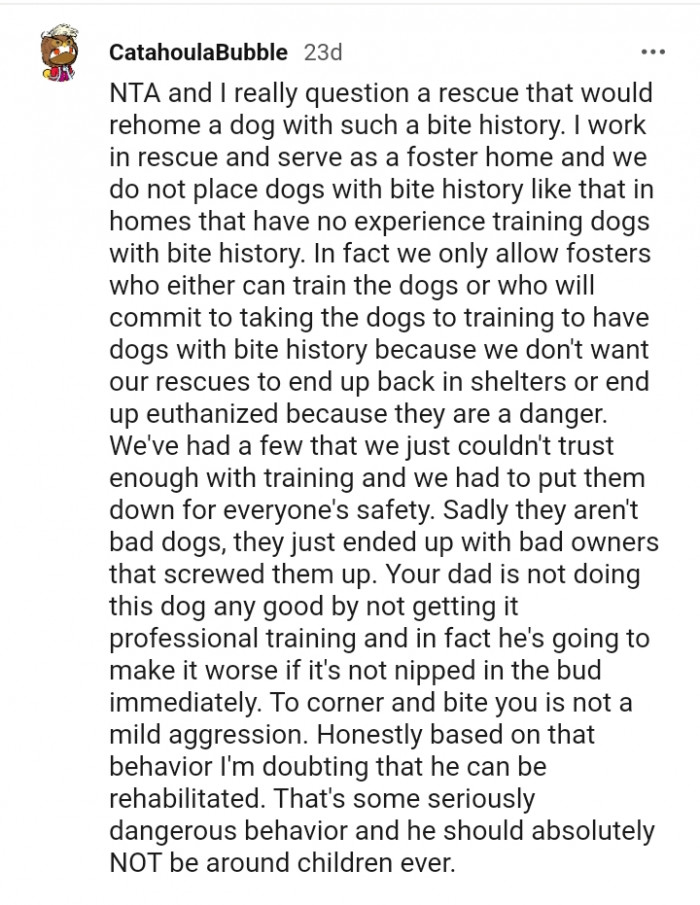
No business at all

It's actually your father's behavior

The Importance of Empathy in Conflict Resolution
Empathy is essential when navigating family dynamics involving fear of pets. Understanding that fear responses are often deeply rooted can help family members respond with compassion rather than judgment.
Psychologists suggest that approaching these discussions with an open heart can lead to more productive and healing conversations.
As simple as...

Dogs' negative or destructive behavior can have a variety of causes, such as boredom, hunger, injury, or disease. Sometimes, even though we believe we are acting appropriately, we send the wrong signals.
Redditors understood the OP's point of view, and the "Not The AH" verdict was given. Drop your thoughts about this story in the comments below and share this post with your loved ones as well.
In conclusion, addressing fears related to pets requires patience and understanding from all family members. By employing effective communication strategies and fostering empathy, families can work towards resolving conflicts and enhancing bonds.
Research from the Journal of Family Psychology underscores the importance of supportive environments in reducing anxiety and improving family relationships.
Psychological Analysis
This situation underscores the challenges of managing fear within family dynamics when pets are involved. It’s essential to approach these issues with sensitivity and an understanding of each family member's experience.
Encouraging open conversations about fears can facilitate compromise and foster a more supportive environment.
Analysis generated by AI
Analysis & Alternative Approaches
Understanding the complexities of fear in family dynamics can foster healthier interactions and improve relationships. By prioritizing empathy and open communication, families can navigate these challenges more effectively.
As clinical psychologists emphasize, creating a supportive atmosphere is key to reducing anxiety and fostering familial harmony.
Analysis & Alternative Approaches
In conclusion, understanding the psychological factors behind fear responses can help families navigate complex dynamics involving pets. According to Dr. Shefali Tsabary, clinical psychologist and author, "Open communication about fears and expectations is crucial for creating a safe and supportive environment." Ultimately, it’s about balancing safety with emotional needs, ensuring that all family members feel heard and respected.



